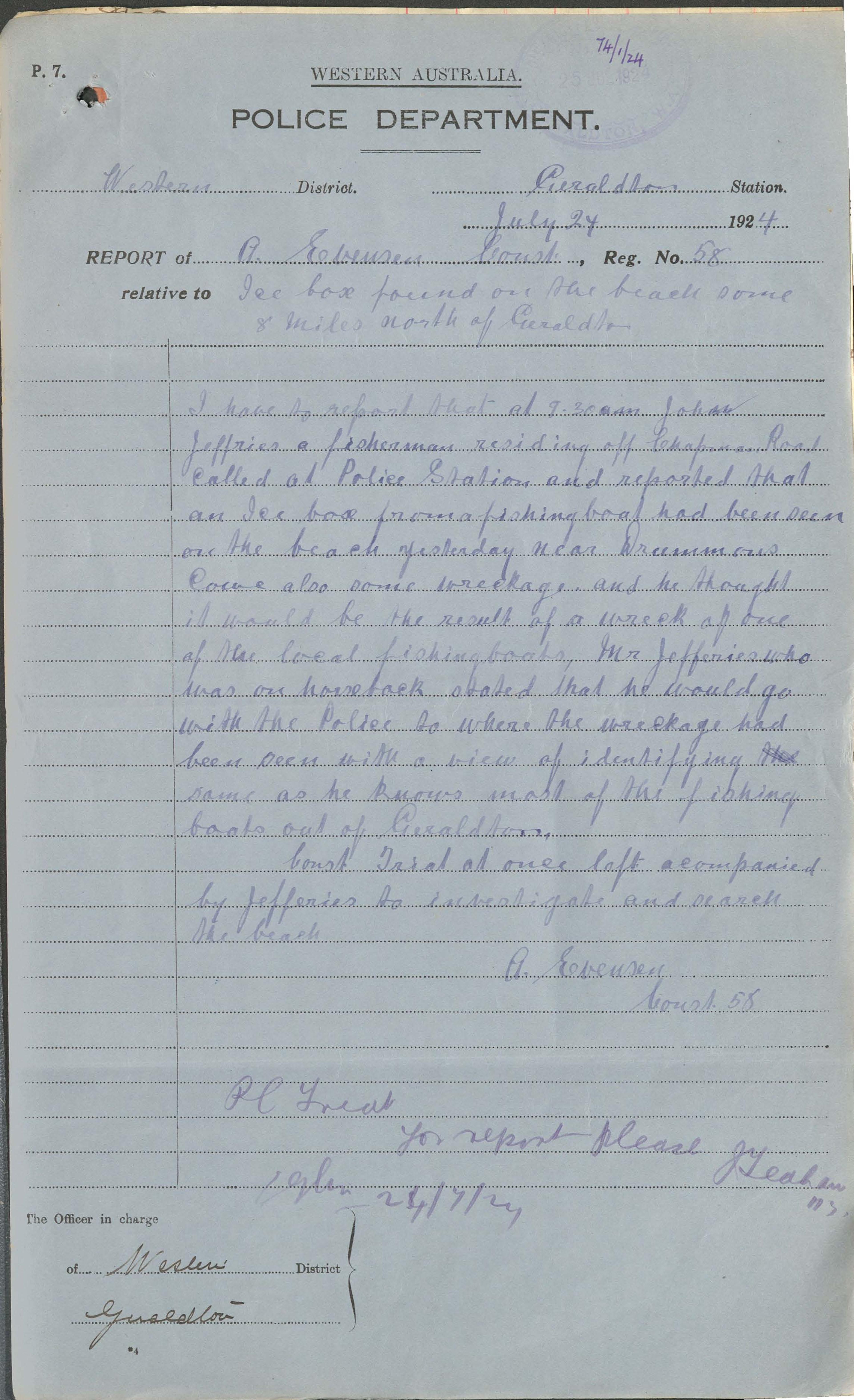Flora Dora
Vessel Name: Flora Dora
John Berger (Jack) Akerstrom
Francis Michael (Frank) Linthorne
Drowned at Sea; Never Found
24 July 1924
The Flora Dora was an unregistered wooden hulled cutter-rigged fishing boat, 28ft (8.5 metres) long and typical of the fishing smack operating at the time. She had been owned by John ‘Jack’ Berger Akerstrom of Geraldton for 13 years. Akerstrom and his crew, Frank Linthorne, (who had built the boat) left Geraldton on 15 July 1924 to fish north of Geraldton. On 21 July, a severe north-west storm struck the Geraldton area which raged for approximately 53 hours.

Constable Triat Police report
The Flora Dora was last seen in Port Gregory on 17 July 1924 by an old friend, Jack Asplin. At that time, they had half a chest of snapper aboard. According to Asplin, they had camped the previous night at the Murchison River Mouth. During the early hours of that morning, a heavy blow came up, and when morning broke, they discovered the boat had tangled its mooring and its forward deck was well under water. Despite this, they put it back out to sea and were not worried much about the damage. The next night they camped ashore at Port Gregory, leaving before dawn for fishing grounds approximately 50 miles North. They were due back to Geraldton within four days, having a foot of emptiness remaining in the snapper hold.
On 21 July a severe North-west storm struck the Geraldton area. At the time there were 13 fishing boats out to sea, but only 12 returned. The storm was so vicious it had caused considerable damage to boats and other property that had been safely sheltering in the harbour.
On 24 July 1924, a local fisherman, John Jeffery, reported to police at Geraldton that he had seen an ice chest from a fishing boat on the coast some miles north of the mouth of the Chapman River. Constable Triat was sent to investigate and found other indications of a wreck strewn along the coast as far north as the mouth of the Buller River. These included ‘parts of a boat, two 12-ft oars, a smaller oar, the top of a hatch, two pillows and other property’ (Geraldton Guardian, 24 July 1924: 2g) found washed up at Drummond Cove.
The charcoal lined ice chest was capable of holding about 2000 lb (900 kg) of fish, and was partly full of fresh fish. On 26 July, the items were identified by Akerstrom’s 14-year-old son, Eric, as being from the Flora Dora. He had noticed the letter “F” inscribed in the lid of the tucker box as belonging to the Flora Dora.
Tracks indicated that someone had been to the wreck site prior to Constable Trait. His further investigations revealed that a nearby farmer, Arthur Hall of Glenfield, had seen some of the timber and taken it back to his farm. He had not reported the wreckage as there was no mention in the newspapers at that time of any boat being lost. Although extensive searches were made along the coast for many days, the bodies of the two men from the Flora Dora were never found.
John (Johan Birger) Akerstrom, also known as Jack, was born 1st August 1882 in Fjallbacka, Bohuslan in Sweden. He likely arrived in Geraldton around 1906, becoming one of the early Scandinavian fishermen to operate from that port. His Alien Registration papers in 1916 state he first entered the Commonwealth in February 1900. He skippered the Storm King in 1906, transporting crayfish from Wallabi and North Islands in the Abrolhos group to a canning factory in Geraldton. He was described as one of the most efficient and able fisherman of the Port. He married Ethel Grace Stone on the 26th August 1910 in Geraldton, WA. They lived on Gregory Street in Geraldton. Ethel gave birth to 7 children (Erik Albin, Ethel Dagney, Johan Richard [John], Henry Berger [Harry], Grace Winifred, William Joseph [Bill]. One child (Herman) died in infancy.
Ethel Grace remarried Carl Henning (Charlie) Johnson in 1927, who was also born in Sweden. At the time of Jack’s death, he left behind his six children ranging in age from 1.5 years to 14 years. A fund for donations to help Akerstrom’s widow and six children was started in Geraldton called the “Akerstrom Relief Fund”. It culminated with a powerful poem calling for an appeal for the family published in the Geraldton Express on 1 August 1924.
The Loss. Of the “Flora Dora.”
(By “Bang”.)
Boys! I’m making an urgent appeal,
For a home that’s lost its punch,
Let’s help the kiddies attend their school,
Let’s see they have their lunch;
We’re renowned in this fair sunny land,
For our kindly acts and thought,
And when an appeal like this is made,
Against our name there’s never a nought.
Homeward Bound! They left their ground,
With hearts just full of glee.
To know that in a few short days
Their loves ones they should see;
But fate decreed a sterner fate,
My God! Can this be true?
Those loving hearts are stricken sad,
Alone and hapless, they appeal to you.
I know the Geraldton people well,
They’re generous to a degree,
They’ll come up grandly every time,
When an appeal like this they see;
We know not what the morrow brings,
We, too, may be stricken down,
Though fortune smiles on us to-day,
To-morrow may be a frown.
So just let’s band together boys,
And help this human appeal,
‘Twill surely touch a tender chord,
That wondrous fellow feel,
So pass the hat for our credit’s sake,
Help this urgent worthy appeal.
The Akerstrom brothers continued in the fishing industry, led by the eldest Eric later operated the fishing vessel, Isobel, which at one stage was used to mine guano deposits on the Abrolhos Islands during World War 2 when superphosphate was hard to come by. Later, he purchased and fitted out the first refrigerated vessel to transport a record catch of snapper (caught off Shark Bay) to the Metropolitan market – the Nord Star.
His brother John Akerstrom had a narrow escape from drowning in 1938 when the 60-foot boat, Magnolia, was washed on a reef 10 miles north of Red Bluff. The Flora Dora 2 was a prominent vessel in the Geraldton fleet owned and operated by the well-known Richard “Dickie” Carr.
Frank (Francis Michael) Linthorne was born and raised in Geraldton in 1890. His Father was William Robert Linthorne from Greenough, and mother Mary Anne McClusky. Both his parents were tailors by trade. He was one of at least eight children. He served in World War 1 with the 7th Battalion Australian Imperial Force suffering various wounds during service. As one article published, “as a returned soldier he bore very evident traces of that great struggle.”
Frank never married and had no children. His sister, Maude Victoria Catherine Linthorne married Alfred Benford and was residing in Fremantle at the time of the tragedy. She placed memorial notices in the Perth Newspapers.
The loss of the Flora Dora resulted in a call for a properly equipped lifeboat to be based in Geraldton, together with a pilot boat. It was pointed out that the Government received a considerable amount of money from each fishing boat - £1 per year boat licence, 10s per year fishing licence, 10s per year to go alongside the Railway Jetty to take in ice and stores, 2s for the use of a truck to bring ice from the end of the jetty to the boat and 2s for fresh water to put in the boat’s tanks. This, together with the fee paid on the fish freighted to Perth by train, meant that the Government had a vested interest in maintaining the safety of the fishing fleet by way of a properly equipped lifeboat.
